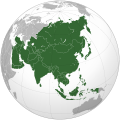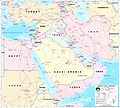Talk:Afroasiatic languages
| This is the talk page for discussing improvements to the Afroasiatic languages article. This is not a forum for general discussion of the subject of the article. |
Article policies
|
| Find sources: Google (books · news · scholar · free images · WP refs) · FENS · JSTOR · TWL |
| This It is of interest to the following WikiProjects: | |||||||||||||||||||||||||||||||||||||||||||||||||||||||||||||||||||||||||||||
| |||||||||||||||||||||||||||||||||||||||||||||||||||||||||||||||||||||||||||||
Branches chart
[edit]@Remsense: I was wondering if you'd be amenable to redoing the table of AA languages. I have a specific source in mind that would be useful as a modal, you can find it in [ https://www-degruyter-com.wikipedialibrary.idm.oclc.org/document/doi/10.1515/9783110420388-007/html "Languages of Ancient Nubia"] p. 130 (fig. 1). You can find that via the Wikimedia library on the De Gruyter website by searching "Languages of Ancient Nubia" if that link doesn't work. It includes the subgroupings within each group as well as a list of some languages in each. Also, after having looked into it, the distinction between "dead" and "extinct" languages is a Wikipedia-ism (or at least an internet-ism) that we should exclude from the table.--Ermenrich (talk) 21:59, 6 January 2025 (UTC)
"Arabic, if counted as a single language"
[edit]I noticed a dispute about whether this parenthetical should be included in the lead, and wanted to request discussion. I checked the cited source and noticed it doesn't make this qualification. Almansa-Villatoro & Štubňová Nigrelli 2023 write "Arabic, the most widely spoken modern Afroasiatic language by far, can boast the third-millenium Akkadian as its oldest attested ancestor." (I'm not sure whether we should be citing this sentence at all since I think it's imprecise at best to call Akkadian, an East Semitic language, an "ancestor" of Arabic, a Central Semitic language.)
Personally, I don't think "if counted as a single language" is necessary here since it is obvious that you need to count Arabic as a single language in order for it to be eligible to for the title of "most spoken Afroasiatic language". If it is necessary to address this question, can a source be provided to back up the point about Arabic being potentially counted as one vs. multiple languages? Another obvious follow-up question that it would be nice to have an answer to: if Arabic is counted as multiple languages, which one of these languages (if any) would qualify as the most spoken Afroasiatic language? Urszag (talk) 02:22, 23 March 2025 (UTC)
- To the source: We aren’t citing the source to describe the relationship of Arabic to Akkadian, so I think that’s neither here nor there. The source is cited for the number of speakers of Arabic and its status as most spoken AA language.
- As to the broader question: I’m sure we can find some sources on that and it’s a good point about which language would then be most spoken. I’ll try to dig into it later.—-Ermenrich (talk) 12:16, 23 March 2025 (UTC)
- I should add - if there’s consensus against including the parenthetical remark, we can just remove it. It’s been there since before I rewrote this article.—-Ermenrich (talk) 14:42, 23 March 2025 (UTC)
- @Urszag: I looked into it - "Arabic dialects as separate languages" seems a minor enough position not to belong in the lead.--Ermenrich (talk) 15:02, 24 March 2025 (UTC)
- Thank you! I wasn't sure, but wanted to discuss to come to a consensus, and it seems like that is now accomplished.--Urszag (talk) 21:12, 24 March 2025 (UTC)
- @Urszag: I looked into it - "Arabic dialects as separate languages" seems a minor enough position not to belong in the lead.--Ermenrich (talk) 15:02, 24 March 2025 (UTC)
- I should add - if there’s consensus against including the parenthetical remark, we can just remove it. It’s been there since before I rewrote this article.—-Ermenrich (talk) 14:42, 23 March 2025 (UTC)
Pronouns are very stable
[edit]Am I insane or are the pronouns in the table COMPLETELY DIFFERENT between the languages? 2A03:EC00:B95D:E0BE:0:0:0:2 (talk) 18:42, 24 May 2025 (UTC)
Neutral point of view
[edit]I don't believe the article in its current state follows WP:NPOV. This article treats Afroasiatic as if it is an established language family on the level of Indo-European or Uralic, when it is still somewhat controversial. E.g. from Campbell and Poser (2008): "Afroasiatic enjoys reasonably wide support among linguists, but it is not uncontroversial, especially with regard to the groups assumed to be genetically related to one another as members of the phylum [...] The Afroasiatic union has mainly relied on morphological agreements in the pronomial paradigms and the presence of a masculine-feminine distinction. This evidence is attractive, but not completely compelling." Stockhausenfan (talk) 15:01, 3 July 2025 (UTC)
- This very quote has been discussed here and elsewhere before (#Campbell and Hodge) -
quite possibly by you. I'm removing the tag - AA is a well-established family accepted by all specialists in the field of AA studies. We've heard it all before.--Ermenrich (talk) 17:24, 3 July 2025 (UTC)- @Ermenrich Ah I just saw that there is a preexisting discussion about this here. But I would recommend striking the WP:ASPERSIONS in your comment about "quite possibly by you". If you have reason to believe that I've violated the Wikpedia policy on using multiple accounts, you can open up an investigation at WP:SPI, else this is an unwarranted personal attack. Stockhausenfan (talk) 17:38, 3 July 2025 (UTC)
- Stockhausenfan: You're right, I apologize and I'll strike that remark. Previous bringers of this objection with that citation have generally been trying to separate Egyptian and Semitic languages in line with the Afrocentrist theories of Cheikh Anta Diop, and I jumped to conclusions when I saw that you didn't have a user page.
- I personally agree that some of the evidence for AA is rather thin, but the occasional complaints by Campbell etc. aside, no one in the field seems to seriously question the family. Even Campbell accepts it, really, he's just not satisfied with the state of the field (see previous discussion).--Ermenrich (talk) 20:51, 3 July 2025 (UTC)
- @Ermenrich Thanks and thanks for the explanation; this indeed makes sense. I'm a layperson myself and not super knowledgeable about this topic area in particular (Uralic and Paleo-Siberian is more my interest); I came across the Campbell book from a different book on Ethiopian languages that referenced this excerpt. I'll have to check out the Güldemann reference - seems quite interesting and looking through his other work there is also some stuff on the classification of other African phyla. Stockhausenfan (talk) 22:40, 3 July 2025 (UTC)
- @Ermenrich Ah I just saw that there is a preexisting discussion about this here. But I would recommend striking the WP:ASPERSIONS in your comment about "quite possibly by you". If you have reason to believe that I've violated the Wikpedia policy on using multiple accounts, you can open up an investigation at WP:SPI, else this is an unwarranted personal attack. Stockhausenfan (talk) 17:38, 3 July 2025 (UTC)






